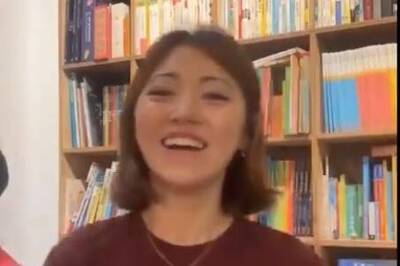《TAIPEI TIMES》 ‘Chinese Taipei’ misrepresents Olympians

Premier Su Tseng-chang delivers a speech at a send-off ceremony for the national Olympic team at Taipei International Airport (Songshan airport) yesterday. Photo: Peter Lo, Taipei Times
FORCED TITLE: Most of the nation’s Olympians identify as Taiwanese, and a majority of them do not hail from Taipei, adding another layer of absurdity to the misnomer
By Jason Pan / Staff reporter
The sports world is to focus on the Tokyo Olympic Games starting on Friday, and once again Taiwanese will not have a “Team Taiwan” to cheer for, but will be stuck with the deceitful, contrived name of “Chinese Taipei.”
It is a dishonest name, imposed by international politics under pressure from China and the International Olympic Committee, acquiesced to by the former lackeys on Taiwan’s Olympic committee.
For a majority of Taiwanese, it is more fitting and simpler to shout “Go Taiwan!” (台灣加油). More people are saying that “Chinese Taipei” is a gross distortion and fraudulent representation for Taiwan’s star athletes in terms of their identity, roots and hometowns.
Most Taiwanese athletes are not from Taipei, and most have said in interviews that they identify as Taiwanese.
In general, they come from working families, from towns and villages across Taiwan. None of them were born in China and none identify as Chinese.
The athletes’ sentiment over identity is in line with national trends. A survey conducted by the Taiwan Thinktank in December last year found that 85 percent of respondents identify as Taiwanese, while only 8.7 percent consider themselves Chinese. Another survey conducted in February last year by the Taiwan Public Opinion Foundation showed 83.2 percent considered themselves Taiwanese, while only 5.3 percent identified as Chinese.
It is high time that the government and sports authorities rectified the nation’s title to “Taiwan” for international sports events.
Olympic medalist Chi Cheng (紀政) has been a vocal advocate for rectifying the nation’s title, saying: “We are Taiwanese. It is our name,” and “Let the world hear the voice of Taiwan.”
Chi had registered her nationality as “Taiwan” when she competed in the Olympics: Rome in 1960, Tokyo in 1964 and Mexico in 1968.
World No. 1 women’s singles badminton player Tai Tzu-ying (戴資穎), who has won multiple titles in top international competitions, is among the Taiwanese star athletes heading to Tokyo.
Tai took up badminton when attending Kaohsiung Minchuan Elementary School under the tutelage of her parents. While still a teenager, Tai represented Kaohsiung at the Taiwan National Games in 2009, and began her international career that year by participating in the Badminton Asia Youth Championships in Malaysia, winning a silver medal.
After competing in overseas tournaments, Tai always returns to Kaohsiung, and last year she accepted an invitation by the Kaohsiung City Government to serve as a “goodwill ambassador” to promote tourism to the city.
Tai has said she is proud to represent Taiwan and of her Kaohsiung roots.
She competed at the 2017 Summer Universiade in Taipei, instead of pursuing prize money and points at that year’s BWF World Championships in Glasgow, Scotland.
Tai at the time said: “It is not just about winning first or second place. My goal is to showcase Taiwan on the international stage. When Taiwan is seen around the world, it is a wonderful feeling for me.”
After winning a gold medal at the Universiade, Tai said: “As a Taiwanese, I feel that it is important for me to stay and take part [in the Games], because Taiwan is hosting it.”
Before heading to Japan, Tai posted a message to her fans, saying: “Believe in yourself, cheer for Taiwan,” and urged people to support the Taiwanese delegation at Tokyo Olympics.
The national Olympic team includes other athletes well-known among international sports fans, such as tennis players Latisha Chan (詹詠然) and Chan Hao-ching (詹皓晴), who are regulars at Grand Slam and WTA events. The sisters are to compete in the Olympic women’s doubles event.
The Chans come from a Hakka family in Taichung County’s Dongshih Township (東勢).
Joining the Chan sisters on Taiwan’s tennis team is Lu “Rendy” Yen-hsun (盧彥勳). His parents came from Pingtung County’s Jiouru Township (九如), and later moved to then-Taoyuan County, where Lu was born, and later relocated to then-Taipei County.
Olympic bronze medalist weightlifter Kuo Hsing-chun (郭婞淳) is Amis and her family’s hometown is in the Falangaw community (馬蘭部落) of Taitung City. Chiang Nien-hsin (江念欣) is to compete in the women’s 55kg weightlifting. She is Bunun from Kaohsiung’s Kaluvunga community (桃源部落).
Sprinter Yang Chun-han (楊俊瀚) is Amis and hails from Hualien County’s Mangcelan community (松浦部落).
Pan Cheng-tsung (潘政琮), who is to compete in Olympic men’s golf, is from the coastal town of Wanli (苑裡) in Miaoli County, which, with the neighboring town Tongsiao (通霄), was originally inhabited by Taokas, one of Taiwan’s Aboriginal Pingpu communities.
These examples show that most of the nation’s top athletes are not from Taipei, and a good proportion are from Aboriginal communities in southern and eastern Taiwan.
“Chinese Taipei” is a misnomer, an absurd and wrongful representation of Taiwanese athletes, and should be discarded to stop misleading sports audiences around the world.
新聞來源:TAIPEI TIMES












